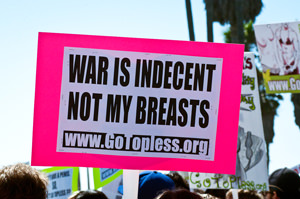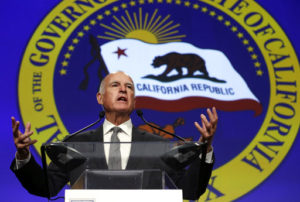Why Women Should Be Allowed to Go Topless in Public
Why can men walk around shirtless in many communal spaces while women can’t? The truth is, female upper bodies shouldn’t be treated any differently from male ones.
Why can men walk around shirtless in many communal spaces while women can’t? The truth is, female upper bodies shouldn’t be treated any differently from male ones. The reason they sometimes are seen as such is due to outdated stereotypes and socially constructed views.
In many states in the U.S. women are permitted to be topless in public, even though some police tend to forget the law, as was the case when Go Topless activist Phoenix Feeley was arrested in New York. In 2005, her victorious lawsuit against the NYPD made headlines. Another problem women who choose to bare their chest in public run into is ambiguous laws that can be used to inflict fines or jail time on those who expose their breasts.
The Atlantic delves into the implications of laws regarding female toplessness:
The problem, as Reena Glazer wrote in the Duke Law Journal in 1993, is that laws [forbidding women’s toplessness] are “written solely to take into account potential viewers. The focus is on the male response to viewing topless women; there is no focus on the female actor herself.” The implication, she argued, particularly when laid next to the statute’s “exemption for topless entertainment” is that “what might arouse men can only be displayed when men want to be aroused.” By contrast, “men are free to expose their chests … with no consideration of the impact on possible viewers.”
That’s where the real damage of these laws comes in: Though it’s unlikely that many men, if suddenly forced to don a shirt while, say, out for a jog, would find their worlds or senses of self greatly affected, the disparity in treatment of the genders appears to offer legal validation that a man’s view of a woman’s body is the only one that matters. The underlying message to the public is that women’s bodies are inherently sexual, and thus inappropriate to be seen in public.
The question then becomes much more basic than whether or not being topless in public is permissible. The issue becomes a matter of women being able to exist and be seen as something other than sexual creatures. The thinking which fuels laws against female toplessness supports the attitude that women are in a perpetual state of sexual engagement, whereas men are allowed to exist in a whole range of bodily states, some of them benign enough to permit the exposure of their chests without it being considered automatically indecent. Proponents of topless equality assert that laws that single out women are effectively perpetuating a degrading cultural norm towards sexualizing women’s bodies without their consent. The concern is that the laws incidentally support a larger mentality of objectifying women.
One of the curiosities of the debate, then, is that both sides argue that they are combating objectification. Those opposed to public female toplessness say it is the exposure of breasts that will sexualize the women baring them. The question, finally, has much to do with how you think laws should relate to society: Is it more advisable to use laws to protect women (and the public) in a society that already views their bodies as sexual? Or should laws challenge preconceptions and foster an evolution in the perception of female bodies? Given that in the US, there are over 200,000 occurrences of sexual assault annually, with 9 out of 10 victims being women, both sides understandably feel that the sexualization of the female body is a high-stakes issue.
Supporters of topless equality argue that laws should be used to normalize women’s bodies to reduce fetishization of them, and as a result, diminish abuse. As is, the only places in America that still fully forbid women from baring their breasts are Utah, Indiana and Tennessee, but thanks to advocates’ work and legal shifts toward gender equality all over the U.S., the three states may follow suit soon enough — or rather, follow sans suit.
—Posted by Natasha Hakimi
Your support matters…Independent journalism is under threat and overshadowed by heavily funded mainstream media.
You can help level the playing field. Become a member.
Your tax-deductible contribution keeps us digging beneath the headlines to give you thought-provoking, investigative reporting and analysis that unearths what's really happening- without compromise.
Give today to support our courageous, independent journalists.





You need to be a supporter to comment.
There are currently no responses to this article.
Be the first to respond.